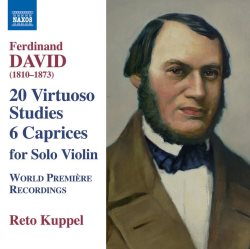| 
|
Ferdinand DAVID (1810-1873)
Twenty Virtuoso Studies for solo violin (based on Moscheles 24 Studies Op.70) [55:06]
Six Caprices for solo violin Op.9 [20:24]
Reto Kuppel (violin)
rec. Studio 2, Bayerischen Rundfunk, Munich, 13 July, 15-16 September 2012; 7-8 January 2013.
NAXOS 8.573048 [75:41]
A child prodigy as a violin virtuoso, Ferdinand David became the leader Mendelssohn’s Leipzig Gewandhaus Orchestra. He was renowned throughout Europe both as a soloist and as an educator. His 20 Virtuoso Studies, based on those for piano by his friend and colleague Ignaz Moscheles, are brilliant transcriptions for the violin.
Straightaway it must be acknowledged that the playing of Reto Kuppel is absolutely sensational and his violin is recorded in very analytical, close sound. That’s ten out of ten so far. The title Studies immediately sets the alarm bells ringing. Other than Chopin’s wonderful Etudes most works bearing this title are exercises written to stretch and improve instrumental technique. That’s fine from the perspective of the player and for those who respond to violin playing as an art in itself. Unfortunately, for this listener at any rate, there’s more to music than technical difficulty, no matter how perfect the execution may be. I personally found the studies, in terms of pure music, quite unrewarding and not especially memorable. There are some felicities along the way and there are changes in mood and tempo to catch the listener’s ear but most of the music is pretty mediocre. It doesn’t possess the greatness of Bach’s solo violin works (but what does, to be fair), the heart-warming tunefulness of Sarasate or the demonic quality to be heard in the Paganini Caprices. I was left thinking: what great playing but what a shame about the music. They are studies in the classic sense of the word and how on earth Reto Kuppel got his standard of execution to this level leaves one amazed and awestruck. He must have lived with the music for a very long time. The arrangements are superb but the issue is the quality of the Moscheles pieces in the first place. There will be violin fanatics out there who collect everything that’s available. If Ferdinand David rocks your boat then I can’t imagine better performances than the ones on this Naxos disc. Other collectors should maybe sample the music online before purchasing the CD.
The Six Caprices are far more rewarding. The melodic inspiration is much higher in this set of pieces and here you find yourself listening to real music, not just a selection of dry exercises. Having said that the level of virtuosity required is also staggering. There are no Paganini-like harmonics and left hand pizzicato effects but the rapid passages that shoot across the strings and the double stopping in 4ths, 5ths and octaves are spectacular. Everything is played with taste and refinement. Tuning and tone are immaculate.
This is so hard to sum up. I didn’t care for the majority of the music. Others will react differently. The playing demands to be heard.
John Whitmore
 |
 |
|











